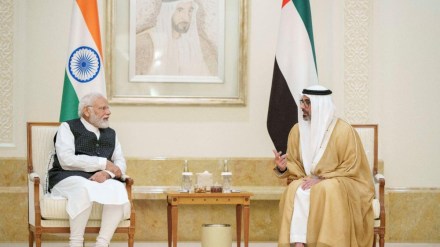India and the United Arab Emirates (UAE) recently solidified their economic partnership with the signing of a Bilateral Investment Treaty (BIT). This landmark agreement, along with a Comprehensive Economic Partnership Agreement (CEPA), signifies a significant step towards fostering deeper ties and promoting mutual prosperity between the two nations. The bilateral meeting between Prime Minister Narendra Modi and UAE President Sheikh Mohamed Bin Zayed Al Nahyan in Abu Dhabi laid the groundwork for this crucial development.
Vinay Kwatra, India’s Foreign Secretary, emphasized the treaty’s importance in bolstering capital flows and creating a conducive environment for investment. At a special briefing in Abu Dhabi, he highlighted its dual objective of safeguarding existing investments while also facilitating further capital infusion into both economies. This strategic partnership is expected to unlock new opportunities for growth and development, benefiting businesses and citizens alike.
Negotiations for the Bilateral Investment Treaty commenced in 2016, signaling a long-standing commitment to strengthening economic cooperation. The inclusion of an arbitration clause ensures a fair and transparent mechanism for resolving disputes, providing reassurance to investors and enhancing the overall investment climate. The Comprehensive Economic Partnership Agreement, which came into effect in May 2022, complements the investment treaty by promoting trade liberalization and facilitating smoother economic exchanges.
With bilateral trade between India and the UAE currently standing at US$85 million, there is immense potential for further expansion and diversification of trade and investment activities. The approval of the Bilateral Investment Treaty by the Union Cabinet headed by Prime Modi earlier this month underscores the government’s dedication to fostering a conducive environment for foreign investment. This treaty is poised to enhance investor confidence, attract more foreign capital, and spur economic growth, ultimately contributing to job creation and socioeconomic development.
In addition to the Bilateral Investment Treaty, both countries have taken steps to enhance connectivity and infrastructure through the implementation of a free trade agreement and the signing of an Inter-governmental Framework Agreement. These initiatives aim to facilitate smoother trade flows and promote regional integration, thereby unlocking new avenues for economic cooperation and collaboration.
The India-Middle East-Europe Economic Corridor initiative represents a significant milestone in enhancing connectivity and promoting trade between India, the UAE, and Europe. This ambitious project aims to establish a seamless transportation network, including railways and maritime routes, to facilitate the efficient movement of goods and services across borders. By leveraging the region’s strategic location and economic potential, this initiative has the potential to reshape trade dynamics and stimulate economic growth across participating countries.
During Prime Minister Modi’s official visit to the UAE, both leaders reaffirmed their commitment to deepening bilateral ties and exploring new areas of cooperation. The discussions encompassed a wide range of sectors, including trade, investment, digital infrastructure, energy, and culture, reflecting the multifaceted nature of the India-UAE partnership.
